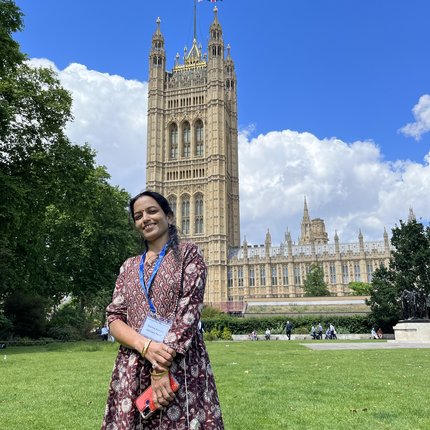Rachna Kumari's Speech at the UK Parliament

On 8 June 2022, the UK Coalition on NTDs hosted a reception at the House of Lords in the UK. The event was supported by the APPG on Malaria and NTDs. The Leprosy Mission was grateful to be able to present three persons affected by leprosy at the event, including Rachna Kumari, who delivered the below speech.
Lords, Ladies, MP’s and Esteemed Guests,
I am pleased to have been invited to speak to you here today, to share with you some of my experiences as a person affected by leprosy. My name is Rachna Kumari and I am from India. I am happy to inform you that I have been cured.
My life with leprosy began in 2008, as a young mother of 24, with two little children. The diagnosis was a shock for me and my husband. I received very little information about how the disease might progress and no support on how to manage the medications. Within a year of my diagnosis my husband passed away suddenly. I was a widow, very ill and with no way to support my family.
Although I received treatment, I suffered from leprosy related complications and extreme pain for the next 8 years. This is because I was not diagnosed and treated soon enough. During this time I have suffered discrimination, internalised stigma, depression and suicidal thoughts.
As a woman and young mother, I faced a great deal of difficulty. When I was first diagnosed with leprosy my husband advised me to stay with my mother and paid for my treatment there, as he feared that I would not be accepted by his family.
When my husband died, my in-laws refused to support me or take me back. They did not want a daughter in law who had marks from leprosy on her face. They were ashamed to take me to social functions and attract the attention of the neighbours. They were also afraid of getting leprosy from me and refused to let me stay in the family home, even though I was no longer infectious. Till today I have not been given my husband’s share of property. I am still fighting for my rights in this case.
I tried to work and support my family, but the leprosy reactions would make me very ill and disfigured my hands and body. I stopped attending social functions or meeting people and would hide my face with a scarf when I went out. I was afraid of how people might treat me if they found out I had leprosy.
The feeling that hurt me most was that being a mother, I could not be there for my children when they needed me. I was very worried that my children would get this disease from me and would not hold them and hug them. I spent so many months in hospitals and have lost important years of their growing up.
The biggest change in my life came when I received holistic treatment not for just for leprosy but as a person affected by leprosy. I received treatment for the long leprosy complications and counselling for my mental health- my anxiety and depression. I was given hope and support to find a job. This gave me confidence and dignity. This gave me a will to live and make a difference for other women like me.
Leprosy is a disease that can be easily cured if diagnosed and treated early, but its complications and effects are life- long. People affected by leprosy are working together to tackle the stigma and discrimination faced by many. For example in my home state of Bihar , the State Forum of leprosy affected people successfully advocated for improved disability pensions for people with leprosy- related disability and are fighting for land rights so people affected by leprosy are not unfairly evicted.
Leprosy can be ended for good and it is something that we can do in our lifetimes. This means strengthening health systems for early diagnosis and treatment and supporting people with life-long leprosy related complications. It will take hard work, investment and co-operation from everyone, including governments around the world. But it is possible; we have the tools to make this a reality.
The UK can and is playing a role in that. I hope that you will join us and become a part of doing everything we can to make sure no one is diagnosed with leprosy again.